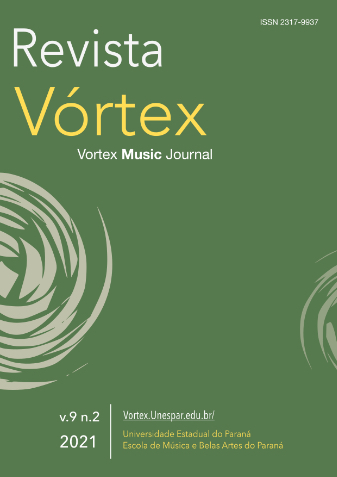What Pd Can't Teach; What It Can
DOI:
https://doi.org/10.33871/23179937.2021.9.2.13Palabras clave:
pedagogy, digital, analog, rationalization, statistical feedbackResumen
Pure Data's long appeal is partly owed to its visual layout and intuitive mode of use. This might lead one to consider it a useful pedagogical tool, even if it now meets stiff competition from glitzier and more user-friendly applications. In the author's experience, however, Pd's ambiguous location on the spectrum of virtualization makes it bad for teaching but gives it a far more important function for composers. In occupying an uncanny valley between the digital-as-digital and the digital-as-analog, it resists the general tendency of digital technology to obscure awareness of itself, that is, of the digital computer as the current high watermark of a longer history of rationalization. It thus pushes composers of computer music back towards the questions that are at the heart of their work. This dynamic is illustrated by the author's experience of developing and tinkering with a novel technique of sound synthesis.Descargas
Citas
AMES, Charles. Thresholds of Confidence: An Analysis of Statistical Methods for Composition, Part 1: Theory. Leonardo Music Journal, Vol. 5, 1995, pp. 33-38
PUCKETTE, Miller. Max at Seventeen. Computer Music Journal. Volume 26, Issue 4. Winter, 2002. pp. 31-43.
PUCKETTE, Miller. Interview on Future of Coding (podcast), episode #47, Miller Puckette - Max/MSP and Pure Data. May 12th, 2020. <https://futureofcoding.org/episodes/047.html> last accessed, November 26, 2021.
GALLOWAY, Alexander. The Interface Effect. Polity Press, 2012.
GALLOWAY, Alexander. Laruelle: Against the Digital. University of Minnesota Press, 2014.
DELEUZE, Gilles; GUATTARI, Felix. A Thousand Plateaus: Capitalism and Schizophrenia. Continuum Press, 2004 (original publication of translation, 1988).
MATHEWS, M. V. The Digital Computer as a Musical Instrument. Science, New Series, Vol. 142, No. 3592, 1963, pp. 553-557.
POLANSKY, Larry; BARNETT, Alex; WINTER, Mike. A Few More Words About James Tenney: Dissonant Counterpoint and Statistical Feedback. Computer Music Journal, Volume 5, Issue 2, 2011, pp. 63-82.
Descargas
Publicado
Cómo citar
Número
Sección
Licencia
Derechos de autor 2021 Joshua Hudelson

Esta obra está bajo una licencia internacional Creative Commons Atribución 4.0.
Los autores conservan los derechos de autor y conceden a la revista el derecho de primera publicación, con el trabajo simultáneamente bajo la licencia Creative Commons Attribution Licence que permite compartir el trabajo con reconocimiento de autoría y publicación inicial en esta revista.






